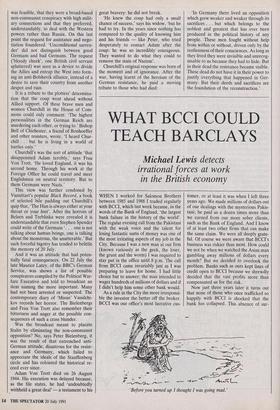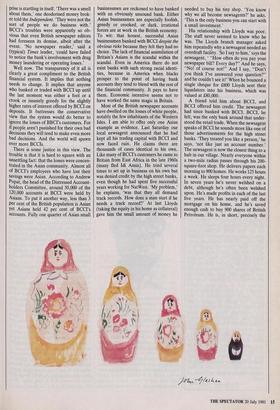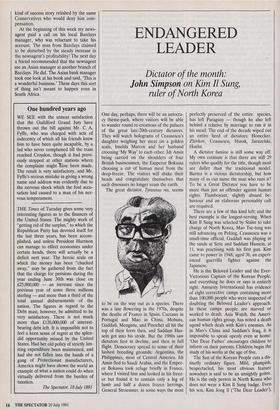WHAT BCCI COULD TEACH BARCLAYS
Michael Lewis detects irrational forces at work in the British economy
WHEN I worked for Salomon Brothers between 1985 and 1988 I traded regularly with BCCI, which last week became, in the words of the Bank of England, 'the largest bank failure in the history of the world'. The regular evening call from the Pakistani with the weak voice and the talent for losing fantastic sums of money was one of the most irritating aspects of my job in the City. Because I was a new man at our firm (known variously as the geek, the loser, the grunt and the worm) I was required to stay put in the office until 8 p.m. The call from BCCI came invariably just as I was preparing to leave for home. I had little choice but to answer; the man intended to wager hundreds of millions of dollars and if I didn't help him some other bank would.
As a rule in the City the more irresponsi- ble the investor the better off the broker. BCCI was our office's most lucrative cus- tomer, or at least it was when I left three years ago. We made millions of dollars out of our dealings with the mysterious Pakis- tani; he paid us a dozen times more than we earned from our more sober clients, such as the Bank of England. And I know of at least two other firms that can make the same claim. We were all deeply grate- ful. Of course we were aware that BCCI's business was riskier than most. How could we not be when we watched the Asian man gambling away millions of dollars every month? But we decided to overlook the problem. Banks such as ours kept lines of credit open to BCCI because we shrewdly decided that the vast profits more than compensated us for the risk.
Now just three years later it turns out that none of those who once trafficked so happily with BCCI is shocked that the bank has collapsed. This absence of sur- `Before you turned up I thought I was going mad.' prise is startling in itself. 'There was a smell about them,' one deodorised money brok- er told the Independent. 'They were not the sort of people we do business with.' BCCI's troubles were apparently so ob- vious that even British newspaper editors had foreseen its demise, albeit after the event. 'No newspaper reader,' said a (typical) Times leader, 'could have failed to notice the bank's involvement with drug money laundering or operating losses.'
Well now. The transparency of it all is clearly a great compliment to the British financial system. It implies that nothing needs to change. It implies that anyone who banked or traded with BCCI up until the last moment was either a fool or a crook or insanely greedy for the slightly higher rates of interest offered by BCCI on deposits. It buttresses the conservative view that the system would do better to ignore the losses of BBCI's customers. For if people aren't punished for their own bad decisions they will tend to make even more bad decisions. And the world will spawn ever more BCCIs.
There is some justice in this view. The trouble is that it is hard to square with an unsettling fact: that the losses were concen- trated in the Asian community. Almost all of BCCI's employees who have lost their savings were Asian. According to Andrew Popat, the head of the Distressed Account- holders Committee, around 50,000 of the 120,000 accounts at BCCI were held by Asians. To put it another way, less than 3 per cent of the British population is Asian yet Asians held 42 per cent of BCCI's accounts. Fully one quarter of Asian small businessmen are reckoned to have banked with an obviously unsound bank. Either Asian businessmen are especially foolish, greedy or crooked, or dark, irrational forces are at work in the British economy. To wit: that honest, successful Asian businessmen banked with BCCI despite the obvious risks because they felt they had no choice. The lack of financial assimilation of Britain's Asians is the scandal within the scandal. Even in America there do not exist banks with such strong racial identi- ties, because in America when blacks prosper to the point of having bank accounts they tend to blend with the rest of the financial community. It pays to have them. Economic incentive seems not to have worked the same magic in Britain.
Most of the British newspaper accounts have dwelled on the losses of white people, notably the few inhabitants of the Western Isles. I am able to offer only one Asian example as evidence. Last Saturday our local newsagent announced that he had kept all his trading capital with BCCI and now faced ruin. He claims there are thousands of cases identical to his own. Like many of BCCI's customers he came to Britain from East Africa in the late 1960s (many fled Idi Amin). He tried several times to set up in business on his own but was denied credit by the high street banks, even though he had spent five successful years working for NatWest. 'My problem,' he explains, 'was that they all demand track records. How does a man start if he needs a track record?' At last Lloyds (taking the equity in his home as collateral) gave him the small amount of money he needed to buy his tiny shop. 'You know why we all become newsagents?' he asks. `This is the only business you can start with a small investment.'
His relationship with Lloyds was poor. The staff never seemed to know who he was. The Lloyds branch manager asked him repeatedly why a newsagent needed an overdraft facility. 'So I say to him,' says the newsagent, "How often do you pay your newspaper bill? Every day?" And he says, "No! of course not!" And I say, "Don't you think I've answered your question?" and he couldn't see it!' When he bounced a single cheque for £800 Lloyds sent their liquidators into his business, which was valued at f80,000.
A friend told him about BCCI, and BCCI offered him credit. The newsagent had since banked with BCCI. BCCI, he felt, was the only bank around that under- stood the retail trade. When the newsagent speaks of BCCI he sounds more like one of those advertisements for the high street banks. 'They treated you like a person,' he says, 'not like just an account number.' The newsagent is now the closest thing to a hub in our village. Nearly everyone within a two-mile radius passes through his 200- square-foot shop. He delivers papers each morning to 900 homes. He works 125 hours a week. He sleeps four hours every night. In seven years he's never welshed on a debt, although he's often been welshed upon. He's made profits in each of the last five years. He has nearly paid off the mortgage on his home, and he's saved enough cash to buy 900 shares of British Petroleum. He is, in short, precisely the kind of success story relished by the same Conservatives who would deny him com- pensation.
At the beginning of this week my news- agent paid a call on his local Barclays manager, who was reluctant to take his account. The man from Barclays claimed to be disturbed by the steady increase in the newsagent's profitability! The next day a friend recommended that the newsagent see an Asian manager at another branch of Barclays. He did. The Asian bank manager took one look at his book and said, `This is a wonderful business.' These days this sort of thing isn't meant to happen even in South Africa.




















































 Previous page
Previous page